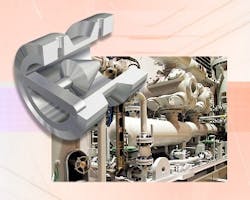Wafer-Cone Flow Meter
McCrometer's advanced Wafer-Cone Flow Meter is ideal for gas or liquid service in line sizes from 1 to 6 inches, such as those required for natural gas compressors. Compressors are used to pressurize natural gas as it travels through pipelines in order to allow it to move as quickly as possible. The accurate metering of compressor fuel gas consumption is necessary for a variety of reasons, including emissions reporting, compressor efficiency, and individual well site gas allocation.
Space-saving and field-proven, the Wafer-Cone Flow Meter can be installed virtually anywhere in a piping system or be easily retrofit into an existing piping layout, resulting in significant installation flexibility and initial cost savings. It is also ideal for other applications including natural gas wellheads, burners or ovens, cooling systems, HVAC and more.
Wafer-Cone technology requires virtually no maintenance, offering cost-of-ownership advantages over traditional DP technologies such as the orifice plate. The beta edge of an orifice place wears down over time, which requires maintenance to maintain accuracy. For maintenance, orifice plate meters require either a bypass line around the meter or shutting down the gas compressor when pulling the orifice plate out of the line to perform maintenance.
The Wafer-Cone Flow Meter relies on unique differential pressure sensing technology that is designed with built-in flow conditioning. It achieves an accuracy of +1.0 percent, with a repeatability of +0.1 percent, and operates over a flow range of 10:1. The Wafer-Cone raises the bar for economy, ease of use and performance.
The Wafer-Cone also greatly reduces the required amount of meter straight-run pipe for installation as compared with technologies such as orifice plates and turbine meters. The Wafer-Cone is highly accurate with only 1-3 straight upstream pipe diameters and 0-1 straight downstream pipe diameters. Its ability to self-condition flow makes it a space-saver, allowing for a reduction of the overall footprint and weight of compressor skids to lower installation costs.
With flow conditioning built into the basic flow sensor design, the Wafer-Cone Flow Meter is also inherently more accurate within a shortened pipe run than traditional DP instruments. It conditions fluid flow to provide a stable flow profile that increases accuracy. The Wafer-Cone's design features a centrally-located cone inside a tube, which interacts with the fluid flow and reshapes the velocity profile to create a lower pressure region immediately downstream.
The pressure difference exhibited between the static line pressure and the low pressure created downstream of the cone can be measured via two pressure sensing taps. One tap is placed slightly upstream of the cone and the other is located downstream of the cone. The pressure difference can then be incorporated into a derivation of the Bernoulli equation to determine the fluid flow rate.
The cone's central position in the line optimizes the velocity of the liquid flow at the point of measurement and forms very short vortices as the flow passes the cone. These short vortices create a low amplitude, high frequency signal for excellent signal stability, resulting in a highly stable flow profile that is repeatable for continuous accurate measurement.
McCrometer - www.mccrometer.com

